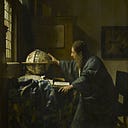The Original Ring of Power
The One Ring, also called the Ruling Ring. A central plot element in Tolkien’s “The Lord of The Rings". A ring forged by Sauron to be the most powerful of all Rings, able to rule those who wore the others and to make the one who wears it invisible. A ring so powerful that would corrupt and enslave the mind and the soul of those near it, making them crave itself and lose their sense of justice.
Greek philosophy
More than 2000 years ago the legend of a ring which granted invisibility to its owner appeared in the Greek philosopher Plato’s “Republic”.
In this book the story surfaces when Glaucon, Plato’s brother, asks Socrates whether any man can be so virtuous to resist doing injustice, even if he could do so without having to fear being detected or suffering the consequences.
The two philosophers are discussing why people act justly. Is it because it’s what’s right or because it is a convention enforced through punishment ?
Glaucon, then, recounts the following story:
Long ago a shepherd named Gyges was tending his flock. After an earthquake, a cave was revealed in a mountainside right next to him. Entering the cave, he discovered that it was in fact a tomb with a bronze horse containing a corpse of a giant who wore a golden ring, which he pocketed. Later he discovered that the ring gave him the power to become invisible by adjusting it. It was at this point that a sordid plan hatched in his mind. He became a messenger of the king of Lydia and inside the palace, he used his new power of invisibility to seduce the queen, and convince her to betray her husband. With her help Gyges murdered the king and became king of Lydia himself.
Glaucon tells this story to demonstrate how people can benefit from acting unjustly. He argues that: “No man would keep his hands off what was not his own when he could safely take what he liked out of the market, or go into houses and lie with any one at his pleasure, or kill or release from prison whom he would, and in all respects be like a god among men”. For him the only reason anyone conducts themselves virtuously is due to external influences. It’s appearing virtuous, not actually being, that matters.
Socrates disagrees. He argues that the human soul has 3 parts: reason, spirit and appetite. Reason guides an individual to knowledge and is influenced by either spirit or appetite. Spirit is righteous while appetite consists of bodily desires. To Socrates the philosopher is led by reason and their spirit prevails on their appetite, making him just and happy. On the other hand, the tyrant succumbs to appetite and acts unjustly. He argues that Gyges is enslaved to his own base desires and isn’t truly happy.
Chinese philosophy
Even before Plato, the Chinese philosopher Confucius reasoned that by simply acting justly one benefits the others, but also oneself.
